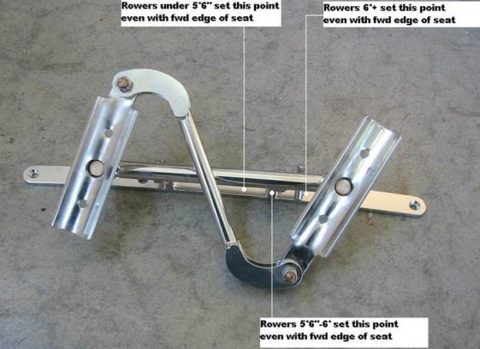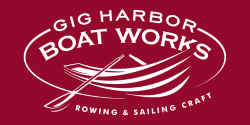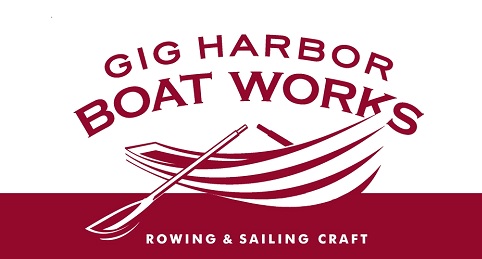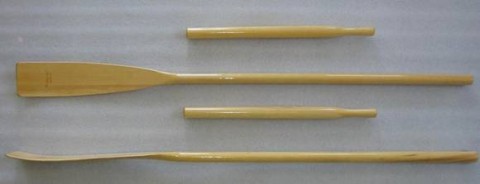Installation
Forward Rowing Home | What is it? | Research and Development | Forward Rowing FAQ | Testimonials
Click here for printable instructions (.pdf file download)
1. Use oars the same length or slightly longer than usual. See Instructions for Modifying Oars, below.
2. Cut the oar into two sections. For the handle, measure the distance across the beam where the oarlocks will be located. Divide that measurement in half and subtract 3″ from the result. This is the approximate length of the handle section, but it may vary to suit personal preference. The remaining blade section should be used as is. (For larger performance-oriented boats with longer oars, we have experienced better results using overlapping handle sections – longer handle sections increase the applied leverage.)
3. Inspect each unit and note that each cradle is marked with a ‘B’ or ‘H’. ‘B’ is for the blade section; ‘H’ is for the handle.
4. Mount the handle and blade using the ¼” x 2 ½” bolts with the included machined washers and lock nuts. Be absolutely sure the blades are mounted vertically.
5. Install the base units on the gunwale with ¼” flathead bolts and locknuts. The precise mounting point will be determined by your height; proper mounting points are specified in Fig. A, below. Locate the base so that the specified mounting point is on a line with the forward edge of the seat you will be sitting on while rowing.

Fig A: Guides for proper placement of the Forward Rowing System. Rowers over six feet in height should set the bolt hole 2nd from aft so that it is even with the forward edge of the rowing seat. Rowers 5’6” to 6’ in height should align the aftmost raised pivot boss so that it is even with the forward edge of the rowing seat. Rowers under 5’6” in height should align a point 1” forward of the aftmost raised pivot boss so that it is even with the forward edge of the seat.
Instructions for Modifying Oars
You will need to experiment to find the optimum length. As our system has an “overdrive” of about 15%, you may want to use a total length that is 6” shorter than the length of the oar you would use if it was a conventional, one-piece oar.
If in doubt, start with longer handle and blade because you can always make them shorter – remember, it’s very difficult to make them longer if you cut too short.
Cut the blade section first. Blade section length may be dictated in some cases by how long the blade section can be while still folding into the boat when coming alongside a dock or yacht.
Long distance or power rowers will probably want some handle overlap. Handle overlap also helps add maneuverability in crowded areas.
If apparent effort to row seems high, then you need to either increase handle length, decrease blade length, or both.
Examples of oar section length as relates to boat beam:
10′ rowboat
47″ beam from center to center of oarlock bases
Normal, aft-facing one-piece oar length: 7 1/2 ‘
Fwd Row: Handle Section 24″ Blade Section 54″
—
16′ Open Water dory
53″ beam from center to center of oarlock bases
Normal aft-facing one-piece oar length: 8′
Fwd Row: Handle Section 30″ Blade Section 62″
Gig Harbor Boat Works also sells pre-cut oars for the Forward Facing Rowing System. These oars have a Handle Section 30” in length and the Blade Section is 72”.
Our oars are prime vertical-grade Canadian spruce made in Canada. Spruce oars have much lighter physical weight than hardwood oars. These are spoon-bladed oars, which transfer more power to the water than flat oars.


